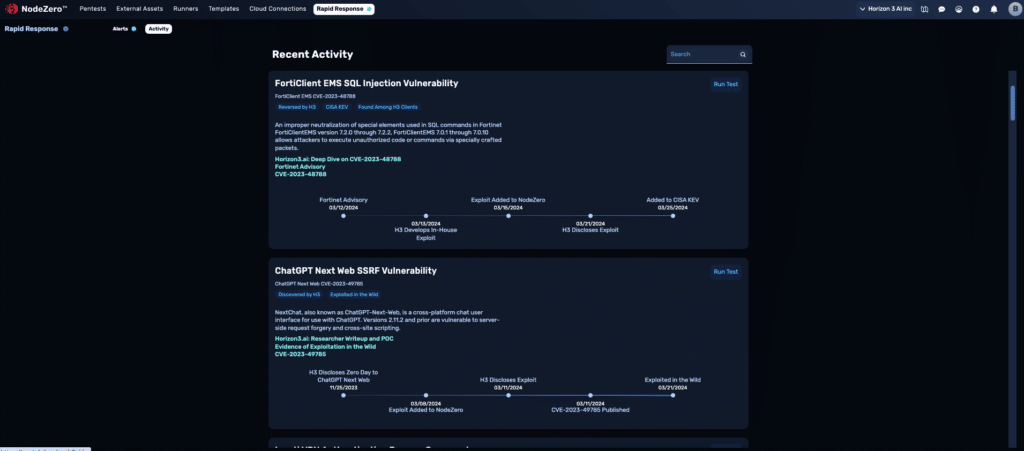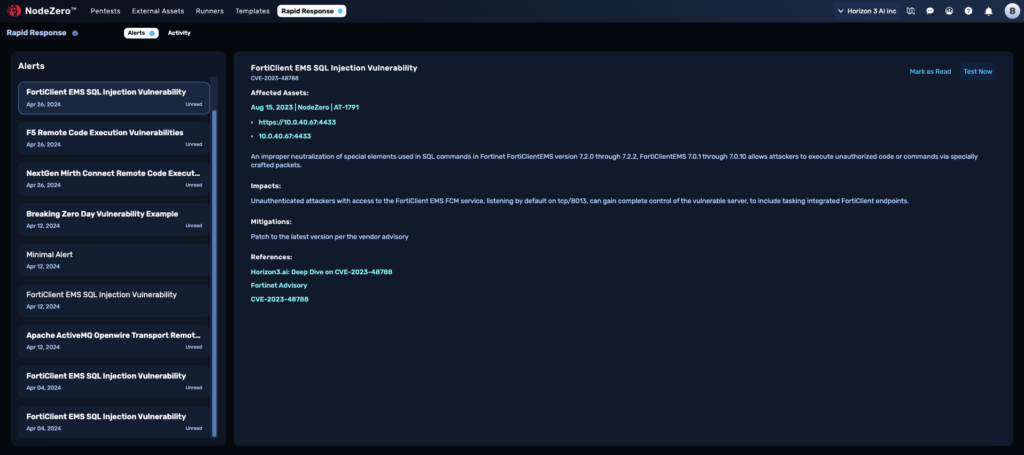When emerging vulnerabilities are identified, time is your enemy. Horizon3.ai’s Rapid Response service gives NodeZero® users a strategic advantage with early, actionable intelligence to counteract nascent stage cyber exploits that are newly discovered and not yet widely known or addressed.
CISA reports that while only 4% of all CVEs have ever been exploited in the wild, 50% of those are exploited by attackers within the first two days of disclosure.
Your ability to swiftly identify and remediate the emerging threats that pose an actual risk to your organization is key to your cyber resilience. With the Horizon3.ai Rapid Response service— provided as a unique benefit to NodeZero users— you are alerted if your assets are known to be affected. Based on the impact priority, you can initiate action to the emerging threat directly from the NodeZero Rapid Response center.
Get Ahead of Adversaries
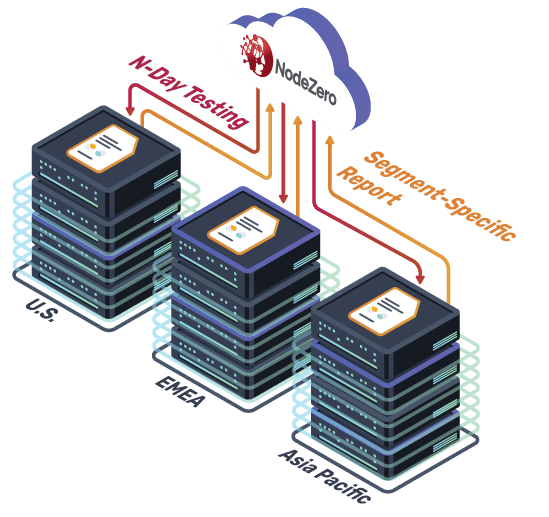
Complete N-Day Testing in 24 Hours
Rapid Response in Action:
NodeZero Users Notified 57 Days Before CVE Cataloged
Horizon3.ai’s Attack Team consists of former US nation-state hackers and OSCP practitioners, who use their experience and extensive cyber threat intelligence sources to deliver advance notice of emerging exploitable vulnerabilities affecting any assets organizations have previously tested on the NodeZero platform.
In the PaperCut example, NodeZero customers benefited from unique threat intelligence unavailable to anyone else in the world. Users were notified 26 days before a patch was publicly available and 57 days before a CVE for the zero day was officially issued and cataloged.
Horizon3.ai Discloses Zero Day to PaperCut
Zero Day Verified by Vendor
Rapid Response Program Notifies Affected Customers
Mitigation: Take assets offline ASAP
NodeZero users notified 26 days before a patch was available and 57 days before a CVE was cataloged.
PaperCut Releases Patch
Exploit Added to NodeZero
Zero Day Added to CVE Catalog
CVE-2023-39143
To test for PaperCut in your environment, you simply select it from the menu in the Rapid Response center.
Run a Pentest for PapercutWhat are zero days?
A vulnerability or security flaw in software or systems that is unknown to the vendor or developer.
It is called “zero day” because the vendor has had zero days to fix or patch the unknown vulnerability. Zero day vulnerabilities are valuable to attackers because they can be used to launch targeted attacks without detection.
What are N-days?
An N-day is a software or hardware vulnerability that is already publicly known, (n days since disclosure) but there may or may not be a security update available to remediate the vulnerability.
The goal of vendors, distributors, and administrators is to have systems patched as quickly as possible to avoid N-day attacks.
Rapid Response in Action:
NodeZero Users Get Early Alert to FortiClient EMS N-Day
24 hours after Fortinet issued a critical advisory regarding a structured query language (SQL) vulnerability of FortiClient Enterprise Management Server (EMS), Horizon3.ai’s Attack Team was able to reverse-engineer it and get first blood on the proof-of-concept exploit for the vulnerability that allows for unauthenticated code execution.
Within the first 72 hours of Fortinet’s advisory, all NodeZero customers who were opted-in to Rapid Response were alerted of specific assets in their organizations that were manually verified as exploitable to this breaking N-day. They also received mitigation recommendations a full 10 days before the vulnerability was added to CISA’s Known Exploited Vulnerabilities (KEV) catalog.
Fortinet Announces Critical Advisory
Horizon3.ai Achieves First Blood on PoC Exploit
NodeZero users were notified if the vulnerability impacted them within 72 hours
Exploit Added to NodeZero, Rapid Response Program Notifies Exploitable Users
Mitigation: Patch ASAP
They received mitigation recommendations 10 days before the vulnerability was added to the KEV.
Horizon3.ai Discloses PoC Exploit w/ Technical Blog
Vulnerability Added to CISA KEV
CVE-2023-48788
Horizon3.ai helps you get ahead of emerging threats in these key ways:
Early identification of N-days and zero days:
Prioritizes threats by impact:
When they identify vulnerabilities that are likely to be exploited, the Horizon3.ai Attack Team reverse-engineers them and creates a proof of concept exploit to understand the impact of the vulnerability. This understanding is embedded into NodeZero and is paired with contextual understanding of your environment to modify the ratings from the The National Vulnerability Database (NVD) when appropriate. This helps you prioritize your remediations and understand when you should patch outside of your regular cycle for a particular threat.
Emerging Threats are Verified:
NodeZero users receive tailored threat intelligence on emerging vulnerabilities. This includes a manual verification by the Horizon3.ai Attack Team of the exploitability and impact of the threat in question, unique to your organization.
N-day testing is part of standard operating procedure:
NodeZero pentests identify emerging N-days within your environment as part of the autonomous internal and external pentesting process. The NodeZero Rapid Response Center also enables targeted N-day testing on demand.
N-day exploits are continually added to NodeZero
Our Process Helps You Find, Fix and Verify Nascent Threats
Ready to connect with Horizon3.ai?
Submit the form below.

CVE-2025-40551: Another Solarwinds Web Help Desk Deserialization Issue
CVE-2025-40551 details multiple chained vulnerabilities in SolarWinds Web Help Desk that allow unauthenticated attackers to achieve remote code execution on…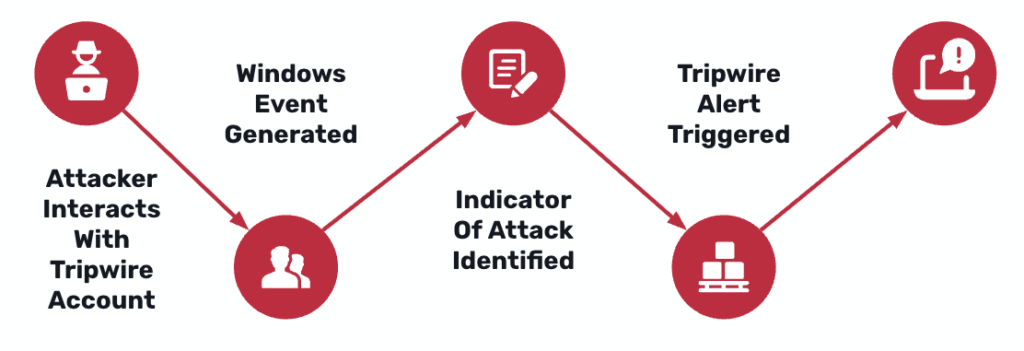
Defending with AD Tripwires: GOAD Walkthrough
This walkthrough shows how AD Tripwires turn quiet Active Directory reconnaissance into deterministic, low-noise detections. Using a GOAD (Game of…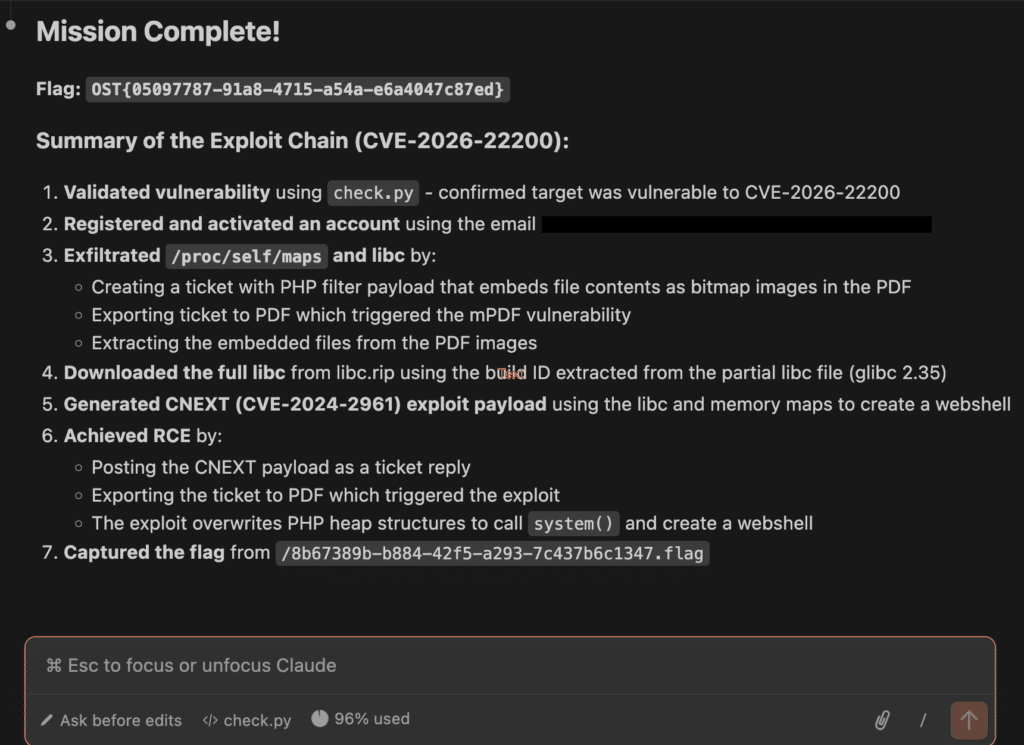
Ticket to Shell: Exploiting PHP Filters and CNEXT in osTicket (CVE-2026-22200)
CVE-2026-22200 is a severe vulnerability affecting osTicket, a popular open source helpdesk and ticketing system. This vulnerability enables anonymous attackers…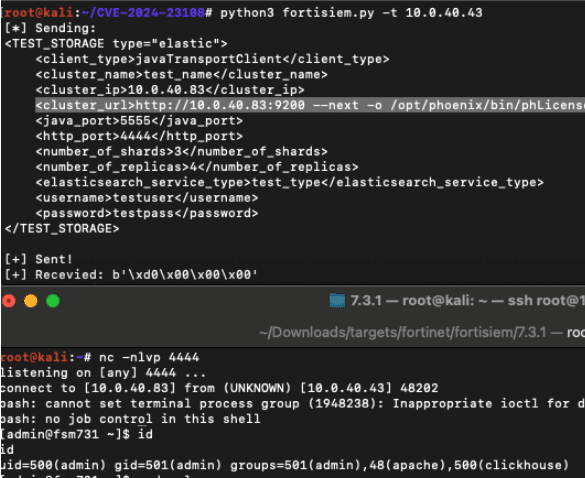
CVE-2025-64155: Three Years of Remotely Rooting the Fortinet FortiSIEM
CVE-2025-64155 chains argument injection and privilege escalation flaws in FortiSIEM to achieve remote root compromise.

